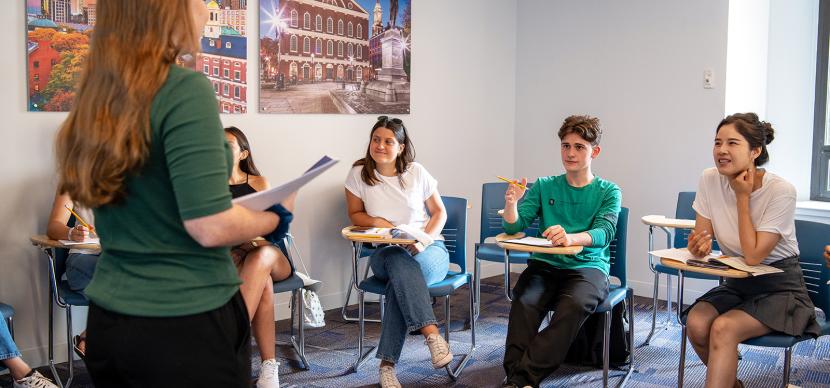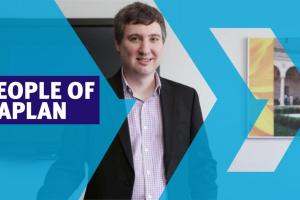Learn about our company, our employees and how we can change your life.
Famous English Teacher Interviews - Kaplan reviews

Interview1: Rachel Smith (Rachel's English)
Kaplan are delighted to talk to Rachel Smith from the popular YouTube channel Rachel's English. Rachel's English teaches American English pronunciation to non-native speakers through video-based lessons and exercises.
Rachel lives in New York and recently visited Kaplan's language school in the Empire State Building. You can discover what she thought about her visit by clicking the link here.
What made you become an ESL teacher?
I had worked part time, off and on, teaching ESL during graduate school after having taught for a semester in the Dominican Republic as part of a study abroad program in undergrad. When I got really serious about teaching though, and started considering it as a full time job, I was really into exploring the human voice and how we use it. And, of course, how to teach how we use it. It came from that passion more than a passion for languages or even teaching.
Which other ESL teachers do you admire and why?
Jennifer Lebedev of JenniferESL. She produces very clear videos on various grammar topics that I often recommend to my students. I had the chance to meet her at the TESOL convention in 2012, and we have had some email correspondence. It’s great to be in touch with another YouTube ESL teacher. Also, I greatly admire the book The American Accent Guide by Beverly A. Lujan. She has done a great job of talking about the rhythmic structure of English in book form.
What would you say to someone was considering being an ESL teacher?
Smart choice! I think we’ll continue to see growth in this field. This is work where you can really see the benefits and the positive impact on the lives of others. With improved English-speaking ability, I've seen student pass exams and get jobs that opened new doors for them.
What do you think is the future of ESL teaching?
I think we’ll see more and more people supplementing classroom lessons with online learning. There are lots of people like me out there making free content. As long as the quality is high, the sky is the limit for self-study and classroom use.
Perhaps we’ll even see the role of the teacher shift a bit: from the one responsible for teaching all aspects of the content to the one who curates good content and materials made by other teachers, while overseeing the learning process.
Interview 2: Javier Figarola (CEO of ABA English)
In this "interview with the experts", Kaplan speaks to Javier Figarola, the CEO of ABA English. ABAEnglish.com belongs to American & British Academy, an institution established in 1970 with over 30 years experience in distance-education of English.
What made you enter the English education industry?
My passion for English distance learning comes from my dad who started his first distance learning company in 1964. It was called “Norte Idiomas”. Later he created “Home English” which became Spain’s main English learning company in the eighties and an example of commercial distribution with over 50 offices throughout Spain.
Its learning methodology was based at the beginning on books and recordable cassettes so that the students could contact their teachers. It evolved with the video recorder and later on, with the introduction of PCs, it changed to CD-ROMs.
In 2007 with the internet boom my dad had his first dream: to teach English worldwide with no limits. To do so, he founded ABA English, so that he could make English accessible to everyone.
Having seen someone’s whole life devoted to distance learning, in 2010 I decided to take over, taking advantage of my passion for English teaching which I inherited from my dad and my passion for new technology and the Internet.
My dad reached many people, but I want to reach everyone! I love the idea of using technology as an educational tool for people who did not previously have this opportunity and to improve learning methods in this field.
What are your main duties ar ABA English?
I currently manage ABA English, which is a multidisciplinary team of experts who allow thousands of people worldwide to learn English each day.
One of the most important milestones that I have achieved here at ABA was the completion of the ABA English 4.0 course, which allows us to teach English in the simplest and cheapest way possible, always aiming to reach the greatest number of students.
In 2012 we taught English to 50,000 students and we hope to exceed this figure in 2013. Here at ABA, we believe that learning English is something which everyone is entitled to.
How has the industry changed since you first joined?
The e-learning sector is constantly changing in accordance with the latest technological advances. Until a few years ago, it was only possible to study with books and videos. Later, thanks to the Internet, it was possible to study from anywhere in the world with a computer, but even this is becoming outdated!
Nowadays, it is more common to study with an app on your mobile or tablet, or even directly on your Smart TV. In the future, education will continue to adapt to whatever new means appear, for example, it will soon be completely normal to see people studying with their Google smart glasses while they take the underground to the office.
What are the most challenging aspects of working in the English education industry?
We sell exclusively online but the Internet is unfortunately an over-saturated market. Every day it costs more to reach people looking for a way to learn English online (cost per user).
For this reason, when someone gets to know us, we must be able to get across our learning method as quickly as possible and convince him or her that with our method he or she will learn English and at a very low cost. Every day we work on improving the usability of our course to maximize our number of hits.
Interview 3: Minoo Short
Kaplan are delighted to talk to Minoo Short, the head teacher at Anglo-Link. Minoo has been a Course Director at a number of English language schools and is an English teacher and teacher-trainer.
What made you become an ESL teacher?
English was my favorite subject throughout my primary and secondary education. After finishing high school, I attended an English Language Institute to prepare for the Proficiency test. Once I had passed the test, my tutor asked me if I was interested in taking some of the elementary classes.
That’s how my ESL career started almost 33 years ago. A few years later, after I had moved to the UK, I obtained my Cert. and Dip. TEFLA qualifications, and I have been an EFL teacher and teacher trainer ever since. As of August 2011, I also have a YouTube Channel and teach one-to-one lessons online.
What cultural insights can you get from teaching ESL?
I have been very lucky to be able to meet and teach people of many different nationalities and backgrounds. The cultural exchanges and the sharing of life’s experiences with my students have been extremely rich, and the key to my own personal development. My TEFL career has taught me to be respectful of and curious about each individual and his or her unique culture.
I worked in a residential school in Belgium for 15 years, and we have been running our own immersion courses in the UK since 2002. Therefore, it has always been my students who have traveled to where I teach.Which other ESL teachers do you admire and why?
I have worked with many great teachers and I would like to mention them all. However, if I had to choose one, it would be my TEFL trainer, Rosemary Aitken. Her way of teaching truly inspired me when I was her student, and made me choose TEFL as a life-long career.
technologies are providing us with great tools to make our teaching more learner-centered and more creative.
Interview 4: A.J Hoge
In Kaplan's latest addition to the “Interview with the Experts” series, we get the opportunity to speak to A.J. Hoge.
A.J has a Masters degree in Teaching English (TESOL) and over 10 years experience teaching students at universities in the United States, Thailand, and Japan. He is also the Founder and Director of Effortless English as well as the Co-Founder of Learn Real English.
What made you become an ESL teacher?
I originally started as an ESL teacher to travel and work abroad. Over time I enjoyed the teaching more and more. So I went back to school and got serious about improving my teaching. I found the “traditional” methods to be ineffective, so I tried every new and different technique I could find and gradually created my own approach.
What cultural insights can you get from teaching ESL?
Whether you teach immigrants at home or go abroad you are naturally in contact with people from a variety of cultures. That’s one of the best things about teaching ESL and it’s why I originally started. I still love it. Your worldview broadens naturally in this field.
What would you say to someone was considering being an ESL teacher?
I would say “do it!” because it can be so interesting and rewarding, especially when you teach abroad. With that said, there are some truly dreadful ESL jobs out there (and I speak from experience).
To survive any job, it’s important to learn to lead a classroom of children or adults. I highly recommend Fred Jones’ book “Tools for Teaching” as a primer on classroom “discipline” (ie. leadership). Without this skill, teaching can be hell.
Second, research potential jobs very carefully. Talk to several teachers who work at the company and be sure it’s a good environment. Be sure the teaching and work hours are reasonable.
Interview 5: Drew Badger
In Kaplan’s fourth “Interview with the Experts”, we talk to Drew Badger.
Drew is an English speaking confidence expert, author, entrepreneur and co-founder of English Anyone. English Anyone's YouTube channel has more than one million views. Congratulations to Drew and the team
What made you become an ESL teacher?
Ever since I was a kid, I’ve been a teacher or a coach in various capacities. I’ve always enjoyed the high of learning something and I’ll jump at any chance to help others experience it.
I began teaching English, specifically, because it was the only way I could get a visa to study traditional gardening in Japan. Not terribly romantic, I confess, but it transformed into a serious calling as I learned Japanese. I struggled so much on my own journey to fluency, and discovered so many insights about language learning, that helping others just became axiomatic.
Which other ESL teachers do you admire and why?
I spend pretty much all of my time in the trenches with students trying to figure out the most efficient ways to help people learn. But the few other individuals who I’ve been fortunate enough to cross paths with online through the videos and lessons I produce (Alec Roberts, Sylvia Guinan, Mau Buchler, Jason Levine, Aaron Campbell and AJ Hoge) are doing some very cool things and continue to give me hope for the future of our craft.
Whether you’re a teacher or not, be sure to spend time with educators in other fields. Two books I HIGHLY recommend: Hunters, Herders, and Hamburgers by Richard Bulliet & A People's History of the United States by Howard Zinn.
What would you say to someone was considering being an ESL teacher?
I encourage anyone who has the desire, but urge potential teachers to consider the following:
- Knowing how to speak a language doesn’t qualify you to teach it.
- Teaching is a great way to get out and see the world, but remember that you have a serious responsibility to do right by the students you’ll teach.
- If you have dreams of making a living as an independent teacher, what do you know about sales and marketing?
- I think the future of learning is in technology, but not in the way most people think. Methods of communication (Facebook, videos, online courses, etc.) will continue to help TONS of people to connect and learn online, but the real leaps will come from new learning tools that enable rapid self-teaching through experimentation and instant feedback. What’s been possible for me to do with video has been fantastic, but it’s nothing compared to what I’ll be doing in the near future with software.
Interview 6: Anita (Kaplan Manchester)
Ever wondered what it is like to be a teacher? Do you want to know more about what makes a good Kaplan teacher? This month, we managed to interview one of our teachers at Kaplan Manchester and asked her a lot of interesting questions. Find out what Anita loves most about Kaplan, her favorite moments and what teachers do in their free time…
How long have you been teaching English? And how long have you been with Kaplan?
I have been teaching English for about 10 years now, and have taught in many countries around the world such as Japan, Italy, Oman and Bolivia. I’ve been at Kaplan for the last 2 years
Why did you decide to teach EFL?
I initially went into it as a stop gap between finishing my undergraduate degree and starting my Master's as a way of seeing the world, but I enjoyed it so much that I decided not to do the Master’s and retrain as a EFL teacher.
What’s your best memory so far from working at Kaplan?
My best memory so far was when we took the students to visit the Queen, when she came to Manchester. We gave the students a special lesson on the royal family, then took them down to the train station where she was due to arrive. It was a once in a lifetime event!
 617 275-5955
617 275-5955



